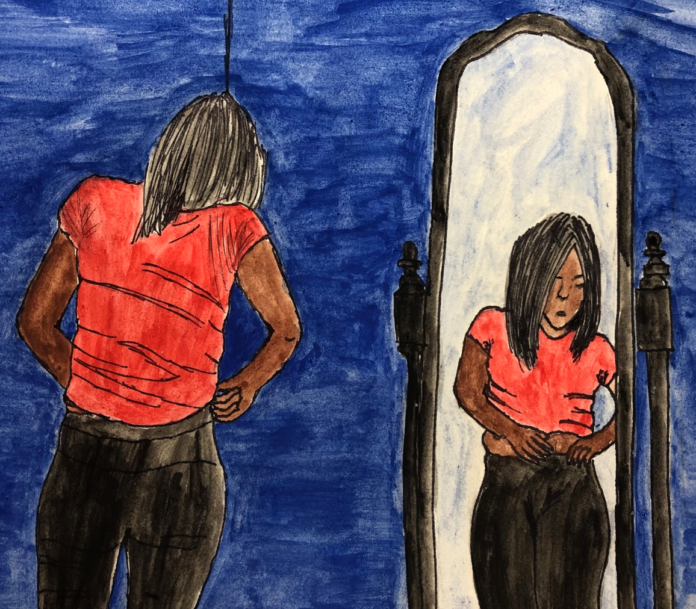There’s nothing sweeter than hearing your phone ding uncontrollably from Instagram likes after posting a photo. It’s even better when you get notifications that your friends are commenting on it: “looking hot!”, “beautiful angel,” “so so pretty<3.” However, that photo isn’t an accurate representation of your physical appearance. Behind the photo, likes and comments are a lot of hard work. You spend hours with your neck craned over your phone, using apps like Facetune, Airbrush or Visage to smooth out your face, tighten your stomach, even out your hair color and make your booty pop a little more. The way people edit themselves in social media photos perpetuates unrealistic beauty expectations that become harmful for others.
According to Statista, Instagram had one billion active users worldwide as of June 2018, with 39 percent of all female adults in the U.S. actively using the app. Around 93 percent of adults polled by Market Wired believe the people they follow edit their photos before posting. Using Instagram isn’t dangerous in itself; in fact, social media can be a positive and important part of our lives. It acts as an outlet for creativity, aids in collaboration and helps us stay connected with old friends. Nevertheless, we have to ensure that we use it responsibly.
We are obsessed with fitting into the societal standard of beauty. Editing apps make height, muscle definition, skin tone, hair color and even teeth whiteness easy to change. The practice is questionable because it changes a lot of things that are natural to the human body, such as stretch marks and cellulite.
Last year, I followed an influencer on Instagram after being wooed by her page. Her Instagram content made it seem like she lived a dream life in Los Angeles. After double-tapping photos on her beach-filled feed for months, I saw her outside the Urban Outfitters in Glendale. I knew it was her, but something was different –– it wasn’t quite her. She had a few blemishes on her face that had never made an appearance in her photos. She stood at an average 5’5″, which was shorter than she looked in her posts. Most noticeable was her butt. Her butt was the star of her Instagram, and she showed it prominently in teeny bikini bottoms — always perky, round and, well, perfect. She was beautiful, don’t get me wrong, but it was clear that the person she portrayed herself to be on social media wasn’t her.
I had spent months feeling self-conscious about my own body because I had been comparing myself to her. But I saw that she was just a normal person with flaws and imperfections just like me, and this made me feel much better about myself. Outside Urban Outfitters, she was more stunning to me than she had ever been; she was a relatable, imperfect human being. People strive to be beautiful by editing out all their imperfections on Instagram. However, we can find beauty in the flaws that make everyone human.
Some people may feel that editing photos can actually increase self-confidence because it allows those who are unhappy with their appearance to quickly fix it. In short, others can see them the way they want to see themselves. However, even if editing photos increases people’s confidence short-term, the long-term effects are detrimental. When many people post edited, fake photos of themselves, it creates a stigma around body image and expectations. People edit and alter their photos to ensure they meet society’s beauty ideals and expectations.
A perfect Instagram can hide and even contribute to mental health issues. According to the Child Mind Institute, perfectly edited social media pages often mask serious mental health issues such as anxiety and depression. Additionally, people who are active on social media daily are more than twice as likely to develop an eating disorder due to their exposure to unrealistic body expectations, according to research from the University of Pittsburgh. People’s expectations of beauty rise as they are exposed to a plethora of false images that portray what everybody wishes they looked like — instead of what they actually look like.
I understand the fascination with editing photos; you don’t even need to pay for Photoshop to do it. There are tons of free apps right at your fingertips that can help create your ideal self. I used to edit all my Instagram photos excessively, creating the person I always wanted to be. My idea of beauty was based on false realities perpetuated by the dark hole of edited Instagram photos. Once I decided to stop editing my photos, I found that I was getting more and more genuine comments — both on the app and in person — about my appearance. While it may be tempting to get sucked into the appeal of photo editing, allow yourself to be vulnerable. Post the most authentic photo of yourself possible. People like real: real is relatable and beautiful.
Aime Fukada is an undeclared sophomore. She can be reached at afukada@oxy.edu
![]()































